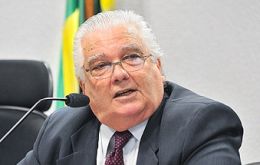MercoPress. South Atlantic News Agency
Economy
-
Monday, August 5th 2013 - 18:32 UTC
Amazon.com CEO buys The Washington Post for 250 million dollars

Amazon.com Chief Executive Officer Jeff Bezos agreed to buy The Washington Post for 250 million dollars, vaulting the e-commerce magnate into the struggling newspaper industry. Bezos is making the deal as an individual and not as part of Amazon, the world’s biggest online retailer, according to a statement on Monday.
-
Monday, August 5th 2013 - 02:11 UTC
Argentine economy conditioned by energy imports and subsidized fuels and power

If the Argentine government does not manage to stabilize its energy balance, which is one of the main drains of US dollars, the ban on hard currency purchases, the barriers to imports and the growing obstacles to spend money overseas for Argentine travellers will continue and could worsen, according to Buenos Aires analysts.
-
Monday, August 5th 2013 - 01:38 UTC
Yerba mate price soars but consumers remain faithful to the traditional infusion

Yerba mate, the classical infusion drink in much of southern South America and particularly in Uruguay is making headlines because of a 34% price increase in the last six months and with prospects of further hikes, according to local providers.
-
Saturday, August 3rd 2013 - 02:30 UTC
Falklands: controversy with the private sector over oil and port policy

A Falkland Islands government statement of policy principles on port location and oil infrastructure development passed at Executive Council last week has been met with opposing views from members of the private sector, reports the Penguin News.
-
Saturday, August 3rd 2013 - 02:08 UTC
Brazil passes strict law on bribing extending liability to staff and companies involved

Bribing a public official in Brazil could become a very onerous mistake for local and foreign businesses under a law enacted that for the first time makes companies liable for bribes paid by their employees.
-
Saturday, August 3rd 2013 - 01:53 UTC
Brazil investment in science, via the ministerial budget reaches ‘an all time high’

Brazil's investment in science has reached an all-time high, with the science ministry's budget increasing from 8.6 billion Real (about 3.8 billion dollars) in 2012 to 12.7 billion Real (around 5.6bn) this year, according to science minister Marco Antonio Raupp.
-
Saturday, August 3rd 2013 - 01:41 UTC
EU FTA agreements with Colombia and Central America became effective August first

Free trade agreements, FTA, signed by the European Union with Colombia, and with Central American countries Honduras, Nicaragua and Panama became effective August first as part of the EU strategy to eliminate tariffs on trade with Central American and the Andean region.
-
Saturday, August 3rd 2013 - 01:38 UTC
Santos describes Colombian economy as the ‘third fastest growing’ in Latam

The Colombian economy is the third fastest growing in Latinamerica with a stable performance in 2012 of 4%; an estimated 4.5% this year and 4.7% in 2014, said President Juan Manuel Santos on making a balance of his three years in office.
-
Friday, August 2nd 2013 - 04:17 UTC
Argentines capable of ‘eluding the Pope and the UN in getting dollars out of their country’

Uruguay president José 'Pepe' Mujica was again ironic in praising Argentines when he stated that the Argentine population “is capable of eluding the Pope and even the United Nations” in their quest to buy US dollars and get them out of the country, in spite of current exchange controls.
-
Friday, August 2nd 2013 - 04:10 UTC
Paraguay advancing on trade agreement with Mexico, previous to requesting Pacific Alliance membership

Paraguay and Mexico have made significant advances in reaching a trade agreement in the framework of the Latinamerican Integration Association, ALADI, according to Paraguayan diplomatic sources.
